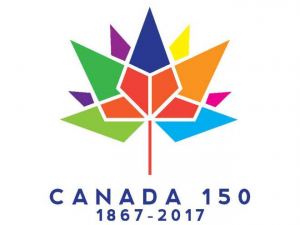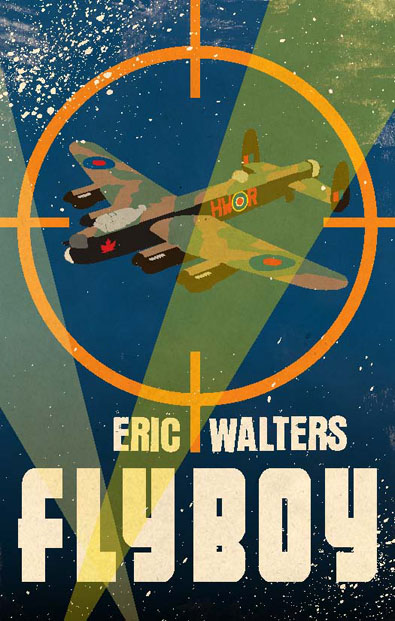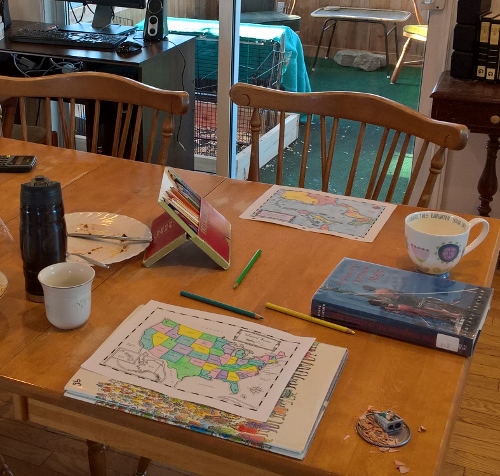Since 2017 is Canada’s 150th birthday, we aim to celebrate that in our homeschool. Some say Canadian history is boring because it has no impressive royalty, revolutions, or invasions, although it does have its own version of each of these. Indeed, its history is a whole lot less dramatic than that of many other countries but it is fascinating in a more subtle way. There are many heroes, from courageous explorers to thousands of unsung settlers, from world famous scientists to authors who continue to inspire, from soldiers to politicians and grassroots influencers. Everywhere, the land and the climate shape us, and always our past influences who we are. That, in fact, may be part of our Canadian identity.
My goal this year is to increase our knowledge of Canadian history’s facts, stories, and personalities and to understand how ideas and international events influenced it and continue to have an impact. Practically, we want to be able to use that knowledge to contribute to our country, both politically and otherwise. Of course, there is also the matter of completing a Canadian history credit for high school.
How will we go about this? First of all, we will intensify our literature-based Canadian history studies, focusing on that in our reading. We also hope to go on at least 12 history-based outings, watch relevant movies, and look at the current Canadian scene from a Christian point of view.
To intensify our teen girls’ multi-year literature-based Canadian history course we will start with a broad outline of the history and geography of Canada learned in the earlier years, just as our older children did. Together we will determine a handful of major dates and topics to focus on, probably from a review skimming of our much-loved Story of Canada and the excellent Canadian history series by Robert Livesey. We will also study a more in-depth, age-appropriate history of Canada.
With this background, we will branch out to interesting rabbit trails and read both fiction and non-fiction about those topics. Current areas of interest include the history of Canadian hockey, science, and country music. We will also, however, read about people and events that the girls are not currently interested in such as the development and influence of the RCMP, various prime ministers, settlers, industries, the underground railway, immigration experiences, local history, the world wars, and whatever else catches our fancy. Ideally, we would locate our readings and movies on maps and a timeline, but we have never yet been successful at this so it may not happen.
One thing about a literature-based study is that the best learning comes from a variety of books: academic tomes, primary source documents, award-winning picture books, exciting novels (both teen and adult), sober biographies, historical photography, poetry, and current activism. Therefore I’m looking at authors such as Pierre Berton and Barbara Greenwood; scholarly sites like Early Canadiana Online; series such as the Touchwood Classics West Collection and The Canadians; visual books ranging from children’s picture books to studies of the Group of Seven and Karsh; and much more. Individual titles I’m considering include Everyday Life in the Wilds of North America by Ballantyne (a bit gruesome, but with lots of geography and history), some of the books by Catharine Parr Traill or her sister Susannah Moodie, Severin’s The Brendan Voyage, or North For Adventure, the story of Samuel Hearne. As long as the quality of the book is high, there is nothing ‘too easy’ or ‘too advanced’ to learn from, and I suppose that is one of the definitions of a living book.
A few of these books I will read aloud, many of them I will leave lying around, and some I will assign.
Canada is full of museums and many of them are celebrating our country’s 150th birthday. We hope to visit or revisit many of those within driving distance. Some people recommend writing reports on museum visits; I prefer discussions and narrations, but if a report is necessary for learning to happen, we will do that. Of course, we can also do living-museum activities at home, looking at heritage recipes, skills, crafts, and more, and I suspect we may end up with heirloom chickens and pots of herbal concoctions.
Relevant movies are legion and I expect to discover many new treasures this year. Movies to re-watch include John Robson’s documentary on the Magna Carta, Two Sisters in the Wilderness, Summer on Ross Farm, Queen and Skipper about The Bluenose and the 1948 thriller about the start of the cold war, The Iron Curtain.
As citizens of Canada, we also want to look at the current Canadian scene from a Christian point of view. Some resources we use for this include ARPA Canada, which provides both information and practical ways to become involved, and CARDUS, which is a Christian public policy think tank. This year we also plan to study Michael Wagner’s book, The Christian Citizenship Guide. Two other books, The Culture War by Jonathan van Maren and Power in Service by Ouweneel, look helpful but may not meet our needs for this course, so I will need to pre-read them.
Canadian History Resources:
I find many of my Canadian history resources at our public library, but I also search
- Early Canadiana Online, a source of primary documents in various languages.
- Northwoods Press, which has an annotated treasure trove of relevant titles.
- Heritage Resources, with a short but excellent list of historical Canadian fiction for homeschoolers.
Please, if you have any resource recommendations for Canada’s 150th birthday, do let me know in the comments.
—
Disclosure: As always, I am not compensated for recommending any of these resources





